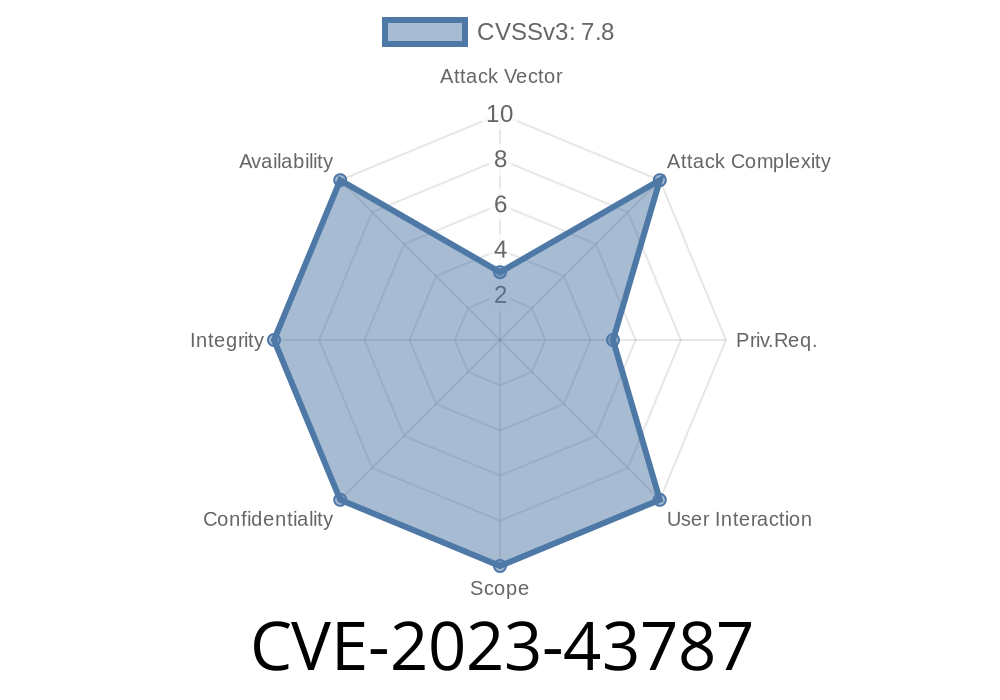In September 2023, security researchers found a severe vulnerability, CVE-2023-43787, in the core X11 library, libX11. This bug affects the way the library handles image creation via the XCreateImage() function. An attacker can exploit this flaw (‘integer overflow’) to eventually run malicious code with higher privileges. For system administrators, Linux users, and developers, understanding this vulnerability is crucial to keep systems secure.
In this article, I'll explain what went wrong, how the bug can be exploited, show you some code samples, and give you official references. My explanation uses basic terms so everyone can stay protected and informed.
What is libX11 and XCreateImage()?
libX11 is the client-side implementation of the X11 protocol—basically, it’s responsible for handling the graphical interface you see on most Linux and UNIX desktops. The XCreateImage() function creates new image objects for display on the screen. It takes user-supplied parameters like width, height, and pixel depth to allocate memory for the image.
About CVE-2023-43787
- CVE: CVE-2023-43787 on NVD
Vulnerability Details: Integer Overflow
Integer overflows happen when an arithmetic operation attempts to create a numeric value that exceeds the maximum limit of the data type (for example, a 32-bit signed integer). If a program doesn't check for such overflows, attackers can trick it into allocating too little memory, and then write more data than expected—leading to memory corruption and code execution.
In libX11, the constructor for images (XCreateImage) calculates the size of an image based on user-supplied parameters:
image->bytes_per_line = (width * bits_per_pixel + 7) / 8;
image->data = malloc(image->bytes_per_line * height);
If width, height, or bits_per_pixel are large enough, the multiplication can overflow, resulting in a small malloc() call but larger read/write operations—opening the door to memory corruption.
In basic words: Bad guy trick program into thinking it needs, say, 32 bytes of memory, but actually writes 4 gigabytes—overwriting other data in memory!
Here is a demo code to illustrate the vulnerability (for educational purposes only)
#include <X11/Xlib.h>
#include <stdio.h>
#include <stdlib.h>
#include <limits.h> // for INT_MAX
int main() {
Display *display = XOpenDisplay(NULL);
if (!display) {
printf("Failed to open display\n");
return 1;
}
int width = INT_MAX / 4; // Large value to trigger overflow
int height = 8;
int depth = 32;
XImage *img = XCreateImage(display, DefaultVisual(display, ),
depth, ZPixmap, , NULL, width, height, 32, );
if (!img) {
printf("Failed to create image\n");
return 2;
}
printf("Image bytes per line: %d\n", img->bytes_per_line);
// This next line could crash or corrupt memory
free(img->data);
XDestroyImage(img);
XCloseDisplay(display);
return ;
}
Warning: Running this demo on a vulnerable system can crash or destabilize your session.
The library continues to write image data into the small buffer, corrupting adjacent memory.
4. By controlling the contents of memory, the attacker can overwrite code pointers or sensitive structures.
Local Privilege Escalation: An attacker with access to a desktop session could become root.
- Potential Remote Impact: In rare setups, remote X11 sessions or applications could exploit this vulnerability.
libX11 Patch:
X.Org Patch: Bounds check arithmetic in XCreateImage
X.Org Security Advisory:
Official X.Org Security Advisory
Red Hat Security Blog:
NIST NVD:
Most distributions (Debian, Ubuntu, Fedora, etc.) have already released fixes. Run
sudo apt update && sudo apt upgrade # Debian/Ubuntu
sudo dnf update # Fedora/RHEL
Conclusion
CVE-2023-43787 is a powerful example of how a simple integer mistake in a 40-year-old graphics library can allow attackers to break through modern security. If you use Linux or UNIX systems with graphical interfaces, make sure you’re running the latest libX11. Always keep your system patched and stay tuned to security advisories.
Remember: Hackers do not sleep—patch today, don’t wait for exploits tomorrow.
Further Reading
- X.Org Patch Details
- NVD Official Entry for CVE-2023-43787
- Openwall: Exploit discussions in X11
Timeline
Published on: 10/10/2023 13:15:22 UTC
Last modified on: 11/07/2023 04:21:29 UTC
